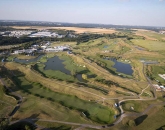
The First - "Trench": 468-yards, Par 4
While many championship courses ease players in with a relatively straightforward opening hole, the first on the Composite is anything but. Normally played as a par-5 by the Fanling members, the first demands accuracy from the tee - with the right half of the fairway giving the ideal line into the green. A fairway bunker down the left, some 275 yards out, has to be avoided at all costs: Simon Yates famously found it in the final round when leading the Open and wound up with a disastrous seven to fall out of contention. Indeed, any drives that aren't played down the right will leave a lengthy blind approach over trees. The pond 50 yards short of the putting surface shouldn't really be in play for the professionals but the back-to-front sloping green is always a test. Players who can manage four pars over the four rounds will be very satisfied indeed.
The Fifth - "Table Top": 192 yards, Par 3
There are some great par 3s on the Composite but the one that drives the most fear into the hearts of the professionals is the aptly-named 5th, "Table Top". Among the longest one-shotters at the club, the difficulty here is not so much the yardage - which at nearly 200 yards may raise a few eyebrows among amateurs - but more about being able to stop the ball on the raised two-tier green. Two deep bunkers protect the front of the putting surface, while a grassy bank at the back will snare any shots that go long. To add to the trickiness, the teebox is surrounded by trees on three sides, making it hard to tell the strength and direction of the wind. Even given the vast distances that most pros hit the ball, the 5th still requires something in the region of a 5- or 6-iron, which is a lot of club for the diminutive green.

Pages
Click here to see the published article.











